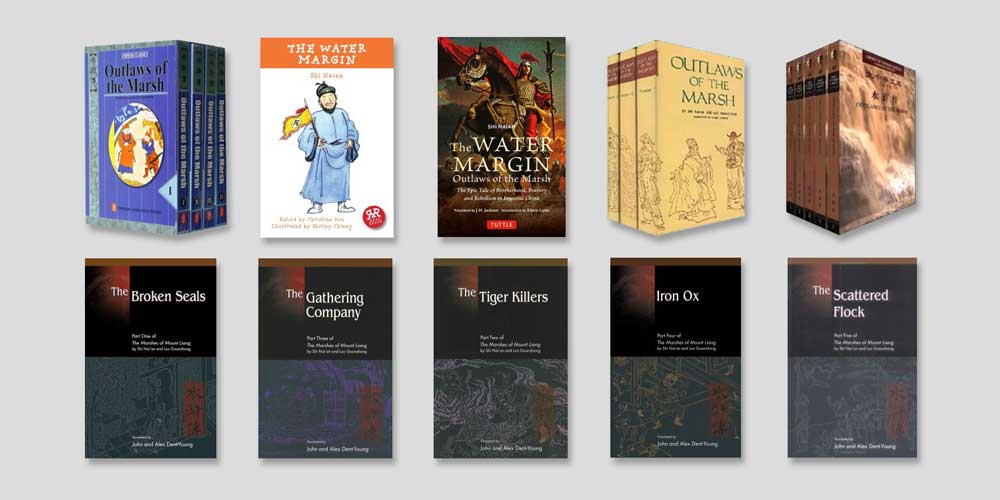“Which English translation of Water Margin should I read?”
TL;DR? If you just want a quick-and-dirty recommendation, jump to the conclusion.
This work is attributed to Shi Nai’an, who may have actually been, or have collaborated with, Luo Guanzhong, author of another Chinese classic novel, The Romance of the Three Kingdoms. There seem to be innumerable versions of the “novel”, which is not so much a novel as a collection of folk tales about 108 bandits.
From the Translator’s note in the Shapiro translation:
“[Water Margin] tells why and how one hundred some-odd men and women banded together on a marsh-girt mountain in what today is Shandong Province, became leaders of an outlaw army of thousands and fought brave and resourceful battles against pompous, heartless tyrants. Historians confirm that the story is derived from fact. Some of the events actually happened, some of the persons actually existed. Their rebellious deeds struck a responsive chord in the oppressed masses and gradually evolved into folk legends. Professional story-tellers further dramatized and embellished them.”
The legends are packaged into a frame story about 108 spirits (or stars) who are released from beneath a stone in a temple and are then reborn into the world to become the 108 “heroes” or outlaws of the marsh. The novel then describes how events in the lives of these characters bring them together as outlaws, and what they do once they have gathered.
Three prominent versions eventually crystalized: a 70-chapter version, a 100-chapter version, and a 120-chapter version.
- The 100-chapter version was published in 1589.
- The 120-chapter version, edited by Li Zhi, was published around 1592, and contains additional adventures.
- The 70-chapter version, edited by Jin Shengtan, was published in 1641. In this popular version, a prologue (rather than Chapter 1) describes the release of the spirits, and, in contrast to the longer versions, the bandits are not redeemed.
There is one in-print translation of each version!
Water Margin: Translations in English
- 1933 – Pearl S. Buck (All Men Are Brothers, 70 chapters)
- 1937 – J.H. Jackson (Water Margin, 70 chapters)
- 1980 – Sidney Shapiro (Outlaws of the Marsh, 100 chapters)
- 1986 – Abridged Sidney Shapiro (Outlaws of the Marsh)
- 1992 – J.H. Jackson abridged by Tynron Press (Water Margin)
- 1994-2002 – Alex and John Dent-Young (The Marshes of Mount Liang, 120 chapters)
- 2010 – J.H. Jackson revised by Edward H. Lowe (Water Margin, 70 chapters)
Water Margin: Why does this book have several titles?
From the Introduction to the 1937 Buck edition titled “All Men Are Brothers”:
“The English title is not, of course, a translation of the Chinese title, which is singularly untranslatable…. I have chosen arbitrarily, therefore, a famous saying of Confucius to be the title in English, a title which in amplitude and in implication expresses the spirit of this band of righteous robbers.”
From the 2009 Preface to the 2010 Jackson edition titled “The Water Margin: Outlaws of the Marsh”:
“Buck based the title of her work on the famous quote from Confucius; ‘Within the Four Seas, all men are brothers,’ which was quoted by several characters in the Shuihu Zhuan, since she believed that this quotation captured the true spirit of the novel. Buck believed that the literal translation of Shuihu Zhuan, the ‘Chronicles of the Water Margin,’ to be meaningless for the English language reader acquainting themselves with the ‘Shuihu’ story for the first time. This edition of Shuihu Zhuan was originally published by the Commercial Press Ltd in Shanghai and translated by J.H. Jackson in 1937. It was this translation that gave the English language the title The Water Margin.”
Are the Liangshan Marsh outlaws heroes?
Wikipedia paraphrases American literary critic and sinologist Andrew H. Plaks as saying that Water Margin presents these traditional heroic stories in a way that exposes the heroism as brutal and selfish, a type of ironic reversal typical of the four Chinese classic novels.
Personally, I can’t see the outlaws as heroic; in the terminology of Reddit/AITA, “everyone sucks here”. In other words, yes, the outlaws are victims, but they are also perpetrators. They may be loyal, brave, strong, clever, and successful at times, and it’s fun to read about them. Still, it would be quite a stretch to say they’re heroic. I imagine that various children’s and TV adaptations tone down the language, sex, and violence, which could give a completely different impression of the characters.
Water Margin: Translation comparison
Extracts have been included so that you can see what the different translations sound like.
Who was Pearl S. Buck?
Pearl Comfort Sydenstricker Buck was the daughter of American missionaries who moved to China. She is the author of the 1932 Pulitzer Prizewinning novel The Good Earth, about a farmer in China who becomes wealthy.
Quick facts about the Buck translation of Water Margin
Title: All Men Are Brothers
Availability: Out of print and under copyright
Completeness: This is a translation of the 70-chapter version.
Romanization: Wade-Giles
More about the Buck translation of Water Margin
Originally published by The John Day Company.
From the 1933 Introduction to the 1937 edition:
“This translation of one of China’s most famous novels, ‘Shu Hu Chuan,’ does not pretend to be a scholar’s effort, meticulous in explanation and documentation. Indeed, in translating this novel, I have had no academic interest at all, and no purpose beyond my delight in the original as an excellent tale excellently told. I have translated it as literally as possible, because to me the style in Chinese is perfectly suited to the material, and my only effort has been to make the translation as much like the Chinese as I could because I should like readers who do not know that language to have at least the illusion that they are reading an original work…. The only arbitrary change I have made in this translation is in the matter of names of persons and places, and since Chinese names seem ever difficult for western readers, I have used one name only for each character throughout…. I have chosen the [seventy-chapter edition] for translation because there seems less question that these chapters, at least, are written by one eclectic author…. I have omitted the epilogue, which is a summary of the additional chapters in the other editions…. It may be of interest to tell here of the method I used in translation. First I re-read the entire book carefully alone. Then Mr. [M. H.] Lung read it aloud to me while I translated as accurately as I could, sentence by sentence. I found that by following his reading I could translate more quickly but at the same time I kept my own copy of the original open beside me for constant reference. After the translation was complete Mr. Lung and I went over the entire book again comparing the translation word for word with the original. As a still further precaution for accuracy I went over the work again with another Chinese friend.”
From the 1937 Introduction to the 1937 edition:
“This revised edition of the translation of “Shu Hu Chuan” is in no sense a complete revision. I am sure there will never be such a thing as a complete revision of this book. At various times, as long as I live, I shall probably tinker at it, changing a little here and there, permanently dissatisfied with it. For there is no such thing possible as a perfect translation of this tremendous novel.” She thanks Mr. Chao Chih-Min of Chiao Tung University, Peiping, Professor Lionel Giles, Mr. Neville Whymant of London, Mr. Arthur Waley, and Dr. L. Carrington Goodrich.
Christie’s: “All Men are Brothers, annotated”
2022 auction results for Buck’s own copy of her translation, signed and with her annotations. Sold for USD 4,032. “Copiously annotated, chiefly with corrections to spelling of characters’ names but also to phrasing and word choice.” Apparently she *did* keep tinkering with it after it was published!
From the 2009 Preface to the 2010 Jackson edition by Edwin H. Lowe:
“Buck’s version… impeded the narrative by her ‘artificial style’ and ‘pedestrian progress.”
Get the Buck translation of Water Margin
This version is out of print. You may be able to find a second-hand copy.
Extract from the Buck translation of Water Margin
First ~500 words of Chapter 1 (from a 1948 copy):
It is said: In the time of the Sung Dynasty in the reign of the Emperor Ché Chung, somewhat distant from the time of the Emperor Jen Chung, there lived in the eastern capital of K’ai Feng Fu, Honan, in P’ien Liang county, an idling, noisy, bragging fellow surnamed Kao, a second son, who from his youth had never established a home. His sole ability was in wielding weapons, in fencing with a staff, and in kicking a ball and at this he was most skillful. People did not call him by his name Kao The Second, but all called him Kao The Ball Kicker, and the name became no longer a nickname but a proper name, Ball Kicker.
This man could blow a wind instrument, could play a stringed instrument, could dance, could shoot, could fence and move swiftly, could play about at anything. He had also learned to compose a little poetry and he could write characters and make such compositions as rhymes and songs. But in the five virtues, in patience, pity, purity, wisdom, reliability, perfection in accomplishing anything, in loyalty and righteousness, he had no ability whatsoever. He went inside and outside the city meddling in people’s affairs. He lived in the house of an official nick-named Raw Iron, and there he helped the official’s son to waste money. Every day they wasted money in small towns and in houses of ill repute such as men call “Wind, Flowers, Snow, Moonlight.”
When the young man’s father, the official, heard of this he accused Kao before the court in the eastern capital and the court ordered Kao beaten twenty strokes and exiled to a distant place. Even the people in the capital did not want Kao sleeping and eating there. Kao was desperate.
Therefore he went to a place west of Huai Ch’en called Ling Huai Chou, and there he took refuge in a gambler’s house whose surname was Liu and his name Shih Chuen. Liu was the eldest in his family. The purpose in life of this man was to take care of travelers from a distance and all idlers without work could gather in his house and all outcasts, also. Kao then went there immediately, even though it was distant, and he stayed for three years.
One spring when the Emperor went out to sacrifice to Heaven and to Earth, the winds were favorable and the rains came suited and in proportion to the needs of men, and so when the Emperor returned he was gracious and ready to forgive criminals. At that time, therefore, Kao Ch’iu, living in Ling Huai, was forgiven also and he wished to return to the eastern capital.
Who was J.H. Jackson?
From the 2009 Preface to the 2010 Jackson edition by Edwin H. Lowe:
“Little is known about J.H. Jackson today…. Jackson’s use of the English language does not present any particular flavor of idiom to suggest his nationality, though I do believe that he was American. Water Margin does use American spelling of the text…. It is possible that Jackson, like so many translators of the period such as Peral Buck, was himself a missionary or of a missionary family…. [W]e can assume that Jackson’s Sinological knowledge, like his ability with the Chinese language was in fact, quite considerable.”
Quick facts about the Jackson translation of Water Margin
Title: Water Margin
Availability: A version updated by is in print.
Completeness: This is a translation of the 70-chapter version.
Romanization: Wade-Giles
More about the Jackson translation of Water Margin
Includes a catalog of the “108 Heroes at Liangshan Marsh” that lists each one’s name, nickname, and chapter in which he first appears, the “Introduction” by Shih Nai-an, and the prologue.
From the 2009 Preface to the 2010 Jackson edition by Edwin H. Lowe:
“Unlike Buck’s version which impeded the narrative by her ‘artificial style’ and ‘pedestrian progress,’ Jackson managed to maintain the rapid pace of action in the story. However, there are shortcomings in Jackson’s translation, which have been attributed to his desire for literal exactness and his prosaic style which often compounded descriptive lines and passages into terse and abrupt statements…. Jackson’s translation also uses what we may now consider to be degrading English language terminology of the early 20th century, such as the use of the word ‘coolie’ for ‘laborer’…. Jackson uses Anglophone terms and titles such as ‘Mr. Wu’ and ‘Mrs. Wang’ throughout the text which tends to sound awkward in the setting of Song Dynasty China…. In common with Buck’s translation, Jackson’s translation is somewhat sanitized compared to the Chinese text. Jackson originally omitted the vulgarity and the profanity… which gave the original Chinese text its vigor and verve…. Jackson omitted the more ribald descriptions of sexual seduction and intrigue, the vivid descriptions of death by arsenic poisoning, the blow by blow descriptions of the blood splattering disembowelment, dismemberment, and mutilation of murder victims, and the precise description of what Westerners considered the most barbarous of Chinese judicial punishments…. Jackson also made explanations and comments in the form of in-text notes in parentheses. Some of these were quite awkward and at times superfluous.”
Get the Jackson translation of Water Margin
This version is out of print. You may be able to find a second-hand copy.
Extract from the Jackson translation of Water Margin
First ~500 words of Chapter 1:
During the reign of the emperor Che Tsung of the Sung dynasty there lived at the capital, Kaifeng, a loose profligate, named Kao, He could handle well either spear or cudgel, and was an extremely good player at football. He was the second son of a Kao family, but instead of calling him Kao, the Second, people gave him the nickname of Kao Chiu (High Ball). Later on, however, he adopted a character Chiu (a name only).
He could play well on wood or string instruments, but was no good at poetry or literature. If there was a discussion of benevolence, justice, propriety, wisdom or virtue he was unable to take part, He wasted his time in the company of the son of a wealthy man, and every day these two spent their time in pleasure resorts. His conduct became so bad that at last the wealthy man lodged a complaint. before the governor who had him arrested, punished with twenty blows of the bamboo, and then banished from the capital.
Kao Chiu went to Hwai Hsi in Lin Hwai Chou where he found refuge in a gambling den, which afforded shelter to all the lay ‘rascals. from. all places, Three. years after this, however, the emperor granted an amnesty so as show his benevolence. Upon hearing of this, Kao Chiu decided to return to the capital, and got an introduction to a man named ‘Tung Chiang-shih who kept a drug store at the Golden Girder Bridge. Upon reading the letter, this man remembered the bad reputation of Kao Chiu, and was afraid that if he lived at his house he might have an evil influence on his children. So after about ten days Tung spoke to Kao ‘Gathering of Clouds,’ also known as the ‘World’s Horizon’ (meaning, there is plenty of room for you). It does no matter if you play.” Kao Chiu again saluted; saying, “I cannot do it.” He begged leave to depart time and again, but as Prince Tuan insisted upon his playing, Kao Chiu had no escape—so he kotowed, and confessed his inability, he then untied the garters round his knees and moved towards the center of the ground. Kao Chiu kicked a few times, and Prince Tuan applauded. Kao Chiu had to use all his skill to please the prince. He played the ball as though it stuck to his body like glue or paste. (He never missed it.) Prince ‘Tuan was highly amused and was unwilling to let Kao Chiu return, so he kept him there for the night. Next day Prince ‘Tuan ordered a banquet and sent a special invitation to Colonel Wang. The latter had become anxious at the absence of Kao Chiu but upon receipt of this invitation he mounted a horse and went to Prince Tuan’s palace. Upon entering the banquet hall Tuan expressed his gratitude for the curios and then said, “This man Kao Chiu kicks equally well with both feet. I should like to have him for my personal attendant—what do you say?” Colonel Wang answered, “If you have any use for him, you may keep him.” Prince ‘Tuan was pleased and offering a glass of wine thanked him. The two men chatted until evening.
Who is/was Sidney Shapiro?
Sidney Shapiro is/was an American soldier, lawyer, and naturalized Chinese citizen.
Quick facts about the Shapiro translation of Water Margin
Title: Outlaws of the Marsh
Availability: In print! But manufactured in China, so maybe hard to get.
Completeness: This translation has 100 chapters. It’s at least 2 volumes.
Romanization: Pinyin
More about the Shapiro translation of Water Margin
This version attributes the text to Shi Nai’an and Luo Guanzhong.
This translation is based on two versions: the 70-chapter version and the 100-chapter version.
From the 1979 Translator’s Note:
“Because of the excellent style and editing of the shorter version, we have used it as the text of our first seventy chapters. With the final thirty we have taken minor liberties.”
From the 1985 Preface by Shapiro to the abridged version:
“[Regarding the unabridged translation:] Only the ‘poems’ introducing each chapter have been cut. Little better than doggerel, they ruin the suspense by revealing what is about to follow. We have also pared down some of the redundancy and cumbersome detail.”
From the 2009 Preface to the 2010 Jackson edition by Edwin H. Lowe:
“[The Shapiro] edition is excellent in its English translation, though given the mores of China and the United States in 1981, it does not do the more colorful gutter language its full justice.”
A two-volume hardcover edition of the complete Shapiro translation was published by Indiana University Press in association with Foreign Languages Press in 1981 (ISBN 025312574X). You may be able to find a second-hand copy of this out-of-print edition.
Three- and four-volume editions are in print (in China) and should still be available.
The Shapiro translation is under copyright and belongs to Foreign Languages Press. As far as I know, FLP has not licensed an ebook because… I don’t know, they just don’t do that. If you want an ebook, get an ebook of one of the other two in-print translations.
Extract from the Shapiro version of Water Margin
First ~500 words of Chapter 2:
During the reign of Emperor Zhe Zong, who ruled a long time after Ren Zong, in Bianliang the Eastern Capital, in Kaifeng Prefecture previously called Xuanwu District, there lived a young scamp named Gao. A second son, he was quite useless. He cared only for jousting with spear and staff, and was an excellent football player. People in the capital were fond of making quips. They dubbed him Gao Qiu, or “Gao the Ball”. Later, when he prospered, he changed “Qiu” to another character with the same sound but with a less inelegant meaning.
In addition to his skill with weapons, Gao Qiu could play musical instruments and sing and dance. He also learned a bit about poetry and versifying. But when it came to virtue and proper behavior, he didn’t know a thing. He spent his time gadding about the city and its environs. Thanks to him, the son of master Wang, and iron-shop owner, dissipated a considerable sum of money in theaters, gambling dens and brothels.
For this reason the father made a written complaint against Gao to Kaifeng Prefecture. The prefect gave Gao twenty strokes, banished him from the city, and forbade the people of the Eastern Capital from either feeding him or giving him shelter. Gao Qiu’s solution was to proffer his services to one Liu Shiquan, known as Liu the Eldest, who ran a gambling house in Linhuai Prefecture, west of the Huahe River. Liu surrounded himself with idlers and riffraff from all over.
Gao Qiu remained with Liu for three years. Then Emperor Zhe Zong prayed to Heaven south of the city, and this caused the winds and rains to become very propitious. The emperor was moved to benevolence, and he declared a general amnesty. Gao Qiu was able to return to the capital. Liu the Eldest wrote a letter of introduction to Dong Jiangshi, a relative of his who ran a medicinal herb shop near the Bridge of Golden Girders, gave Gao some travelling money, and told him Dong would take care of him.
Gao said goodbye, shouldered his pack and returned to the city, where he delivered the letter to Dong. The druggist took one look at Gao, then read the letter.
“How can I put this man up in my home?” he mused. “It would be different if he were straight and honest. The children could learn from him. But he’s just a loafer, and untrustworthy fellow who’s been exiled for breaking the law, and not the kind likely to reform. If I keep him here he’s liable to teach the children bad ways. Yet if I don’t I’ll be offending Liu the Eldest.”
He had no choice but to receive Gao into his home with pretended delight. Dong feasted him every day for ten days, then he got an idea. He presented Goa with a suit of clothes and handed him a letter of introduction.
“The light of my household is too feeble,” he said. “It would only be holding you back to keep you here. I’m turning you over to Su Junior, the Court Scholar. With him you’ll be able to make a start. How does that sound?”
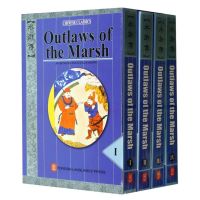
Get the Foreign Languages Press Shapiro translation of Outlaws of the Marsh
Available as a four-volume paperback box set (ISBN 9787119016627, 2480 pages).
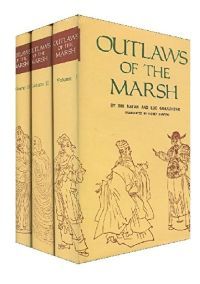
Get the Foreign Languages Press Shapiro translation of Outlaws of the Marsh
Available as a three-volume hardcover set (ISBN 9787119017358, 1605 pages).
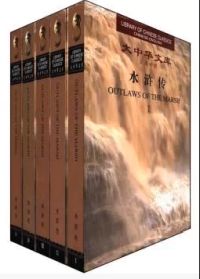
Get the Foreign Languages Press Shapiro translation of Outlaws of the Marsh
Bilingual "Library of Chinese Classics" version.
Available as a five-volume set (ISBN 9787119024097, 3080 pages).
Quick facts about the abridged Shapiro version of Water Margin
Title: Outlaws of the Marsh
Availability: Out of print and under copyright
Completeness: Abridged
Romanization: Pinyin
More about the abridged Shapiro version of Water Margin
Starting in 1986, an abridged version of the Shapiro translation (less than 500 pages) was published by several different publishers.
Danny Reviews: Review of “[Abridgement of] Outlaws of the Marsh” by Danny Yee
“Ending with a description of the hundred and eight outlaws at the peak of their success, this volume is a one volume abridgement of Shapiro’s 1980 Foreign Languages Press translation, in four volumes totalling over two thousand pages. The only accessory information is a three page introduction by Shapiro, offering a little background on the position of the work in Chinese culture. There is no explanation of the abridgement, other than “retaining all the most famous and entertaining episodes of the original in all their excitement, pageant and glory” (blurb) or “the famous favorite episodes in all their excitement and rich detailed colour” (introduction). That makes this particular edition useless for scholarly purposes, but reworking for a popular audience is entirely in the spirit of the original stories and a version of this length should attract a much broader audience. A dozen or so reproductions of woodcuts — without captions or source details — illustrate some of the key events.”
From the 1985 Preface by Shapiro to the abridged version:
“Now, to make Outlaws of the Marsh more conveniently available to a broad general readership, we have produced this abridged version, in paperback, adorned by sixteen of the Ming woodcuts.”
From the unsigned 1984 Editor’s note to the Foreign Languages Press abridgement:
“The present adapted version of Outlaws of the Marsh is based on the excellent English translation of the novel by Sidney Shapiro, published by Foreign Languages Press, Beijing, in 1980. The adapted version set forth in three books, each high-lighting three chieftain [sic] of the Liangshan Marsh stronghold. In order to retain the suspense of the original novel, the editor has taken the liberty of cutting some of the details, where doing so would not resulted [sic] in factual inaccuracy.” The “books” referred to are not volumes, they are parts. The contents are: Book One: Lu Da, Li Kui, Wu Song. Book Two: Yang Zhi, Lin Chong, Mistress Gu. Book Three: Chao Gai, Wu Yong, Song Jiang. The book is thus 9 chapters, but each chapter has multiple shorter numbered sections.
Get the abridged Shapiro translation of Water Margin
You may be able to find one of these out-of-print editions at Abebooks:
Unwin (Sydney, Australia), ISBN 0048200271
Quick facts about the Tynron Press version of Water Margin
Title: The Water Margin
Availability: Out of print and presumably under copyright.
Completeness: Consists of 70 chapters, but the text is very condensed.
Romanization: Wade-Giles
More about the Tynron Press version of Water Margin
The cover says: The Water Margin / Shih Nai-an
The title page says: The Water Margin or The 108 Heroes / Shih Nai-an / Tynron Press, U.K.
ISBN 1856460932, 798 pages. Includes full-page illustrations depicting some of the characters.
Includes a one-page publisher’s introduction, the author’s introduction, and the prologue, followed by a list of “The 108 Heroes of Liang Shan Po” with their each hero’s name, nickname, and chapter where he is first mentioned.
The book was typeset and printed in Singapore, and the mailing address given on the “copyright” page is a Singapore PO box. The “copyright” page says:
“This English translation first published in 1992 by Tynron Press Ltd…. There have been several English translations of this classic, each masterly in its own way. The aim of this Tynron Press edition is to retell the story in a more modern idiom so that it can be read and enjoyed by present day readers. We have relied much on the translation by J. H. Jackson whom we believe to be out of copyright, although, after commissioning a search, we have not been able to obtain documentary evidence of this. We would be glad to discuss matters of copyright if the heirs of J. H. Jackson would make themselves known to us.”
The editor(s) who produced this retelling did not put their names anywhere in or on this book.
The text seems to be completely rewritten, and is much shorter and quite readable, apart from the fact that the names are spelled in the Wade-Giles style, which is no longer standard.
Get the Tynron Press version of Water Margin
This version is out of print. You may be able to find a second-hand copy.
Extract from the Tynron Press version of Water Margin
First ~400 words of Chapter 1:
In the Sung dynasty, during the reign of Emperor Che Tsung, there lived in the capital, Kaifeng, a profligate named Kao. He was skilful with both spear and club, and a good football player. Although the second son in the family, he was not called Kao the Second. Instead, he was nicknamed Kao Chiu (High Ball). Later, he adopted the name Chiu.
He was also a good musician on both wood and string instruments, but he had no taste for poetry or literature and could take no part in philosophical discussions. Instead, he wasted away his time in places of pleasure, accompanied by a friend who was the son of a wealthy man. Kao Chiu’s conduct became so bad that eventually a formal complaint against him was lodged with the governor. Kao was arrested, given twenty blows with the bamboo and banished from the capital. At Hwai Hsin in Lin Hwai Chou, he found refuge in a gambling den which was the haunt of scoundrels from near and far. Three years later, in an act of benevolence, the emperor granted a general amnesty. When he learned of this, Kao returned to the capital, with a letter of introduction to a man named Tun Chiang-shih who owned a medicine shop at the Bridge of Golden Girders. However, this man remembered Kao’s bad reputation and was afraid that if he lived with them, he might have a harmful influence on his children. So after about ten days, Tung said to Kao Chiu, “We can’t do much for you here, but I could recommend you to a certain Mr. Su, who might be able to start you on a successful career. What do you say to that?”
Kao Chiu liked the idea and thanked Tung Shiang-shih, who wrote a note and sent it with Kao Chiu to the home of the high official, Mr Su.
The doorkeeper announced his arrival and Mr Su came out to meet Kao Chiu. However, he also had not forgotten Kao’s profligate youth, and in turn decided to get rid of him by recommending him as a steward to Wang Ching-ching, the emperor’s son-in-law.
The following day Su sent Kao Chiu with a servant to Colonel Wang Ching-ching, who was the husband of the younger sister of Emperor Che Tsung, and son-in-law of Emperor Shen Tsung. Wang enjoyed the company of fun-loving, high-spirited men and he welcomed Kao Chiu as his personal aide.
Who are Alex and John Dent-Young?
“John Dent-Young has taught in Burma, Sri Lanka, Spain, and Thailand, and at present is lecturer in English at The Chinese University of Hong Kong. Alex Dent-Young works as a translator with Baker and Mckenzie in Hong Kong.”
Quick facts about the Dent-Young translation of Water Margin
Title: The Marshes of Mount Liang (The Broken Seals, The Tiger Killers, The Gathering Company, Iron Ox, The Scattered Flock)
Availability: In print!
Completeness: This is a translation of the 120-chapter version.
Romanization: Pinyin
More about the Dent-Young translation of Water Margin
Uses British spelling.
From the Introduction:
“This translation is addressed to the general reader with no specialized knowledge of Chinese. The Shuihu Zhuan is one of the most popular works in Chinese literature, familiar in varying degrees to just about every speaker of Chinese. It seemed essential therefore to make this English version as readable as possible, though without any alteration or abbreviation. For this reason we have kept notes to a minimum and tried to find meaningful equivalents for many local terms and proverbial expressions, while aiming to retain some flavour of other times and customs.”
From “A Brief Note on the Translation”:
“About twenty-five per cent of the verse in our edition seemed too repetitive or too banal even to go into doggerel. Otherwise we have tried to include everything. We have tried not to cut even the pedestrian detail of the narrative links. We have however played around a good deal with word order and sentence length, in order to maintain the cohesion, focus and rhythm of the English; we felt the prose must have its own energy.”
Includes illustrations from “two series of old engravings from the Ming Dynasty. One is known as the Rong-yu-tang, and the other as Yang Dingjian.”
From the 2009 Preface to the 2010 Jackson edition by Edwin H. Lowe:
“This too is an excellent translation, with a restoration of the more vivid language of the Chinese text. One possible minor problem however, is the use of British idiom.”
Extract from the Dent-Young translation of Water Margin
~700 words starting from somewhere in Chapter 2 (from Amazon):
Now there was in those days in the Xuanwu district of the Eastern Capital, Bianliang, or Kaifeng as it is now called, a certain profligate son of a ruined family named Gao. He was the second son, and since his youth he had neglected family affairs and devoted himself entirely to the manipulation of sword or staff, and to football, at which he was very skilled. The people of the capital therefore referred to him not in the customary way as Second Brother Gao, but as Gao Qiu or Gao-the-Ball. Later, when he began to get on in the world, he transformed this nickname into Gao-le-Bel. He could play various instruments, wind and string, danced well, and had a good voice. He was an adept at martial arts, with spear or staff, and wrestling. He had some idea of rhyming and calligraphy, and could turn out a song or an ode. But of generosity, virtue, the rites, wisdom, trustworthiness, reliability, loyalty, or excellence he knew absolutely nothing. He spent his days within and without the walls of the capital, pandering to the rich and famous. He had abetted the son of a wealthy man, Mr. Wang, in squandering a fortune: the two of them used to haunt the pleasure gardens, where they were forever in and out of those Houses of the Wind, the Flowers, the Snow, or the Moonlight. After this the father took out a writ against Gao, and the district court sentenced him to twenty lashes and banishment, forbidding any inhabitant of the capital to give him food or shelter. Thus beleaguered, Gao-the-Ball betook himself to Linhuaizhou, west of the River Huai, where he found refuge with the owner of a gaming parlour, one Gentleman Liu, or Liu Shiquan, to give him his proper name. The latter had devoted his life to harbouring and supporting riff-raff, and it was his pleasure to shelter miscreants from the four corners of the empire. Gao-the-Ball came to rest in Gentleman Liu’s abode and lived there three years.
Later, Emperor Zhe Zong, having gone to offer sacrifices in the southern suburbs and procured propitious winds and timely rains, graciously proclaimed an amnesty throughout the empire. Accordingly in Linhuaizhou Gao-the-Ball received a remission of his sentence and began to plan his return to the capital. Liu Shiquan happened to have a relation in the capital, a certain Dong, who had a medicinal herbs shop under the Golden-Beam Bridge. Liu wrote him a letter which he gave to Gao, together with supplies and money for travel expenses, so that the latter on his return to the capital could lodge with the herbalist.
Gao-the-Ball bade farewell to Liu Shiquan, shouldered his bags, and departed from Linhuaizhou. He made his way to the Eastern Capital, where he went straight to the herbalist’s shop under the Golden-Beam Bridge and presented his letter. After observing Gao-the-Ball and reading the letter from Liu Shiquan, Dong said to himself: “How can I take this Gao into my home? If he were an honest man it might be all right to let him have the run of the house. The children could learn something from him. But he’s an idler and a vagabond, and simply not to be trusted. What’s more, he’s a convicted criminal. Such as he don’t change their ways. If I let him live with us it will disturb the children and set a bad example to them. On the other hand, if I don’t receive him it will be an offence to Liu Shiquan.” So for the time being he saw no alternative but to feign a warm welcome. He took Gao in and invited him to dine and drink each day. After ten days or so, Dong worked out a tactic. He bought a new set of clothes and he wrote a letter. These two things he offered to Gao, saying: “My humble establishments fails to do you justice; I fear you will be held back. I in turn, therefore, would like to recommend you, to the young academician, Mr. Su. Sooner or later you are sure to make your name. How does this proposal strike you?”
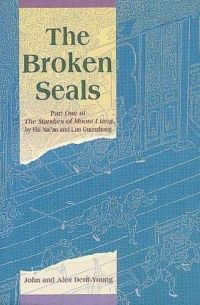
Get the Chinese University of Hong Kong Dent-Young translation of The Marshes of Mount Liang
The Broken Seals: Part One of The Marshes of Mount Liang. Chapters 1 to 22 of the full 120-chapter version.
Available as a paperback (ISBN 9789622016026, 448 pages).
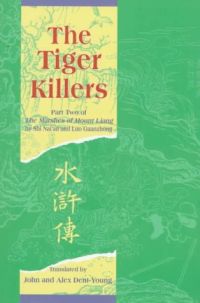
Get the Chinese University of Hong Kong Dent-Young translation of The Marshes of Mount Liang
The Tiger Killers: Part Two of The Marshes of Mount Liang. Chapters 23 to 43.
Available as a paperback (ISBN 9789622017511, 456 pages).
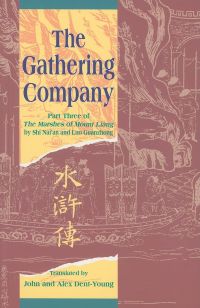
Get the Chinese University of Hong Kong Dent-Young translation of The Marshes of Mount Liang
The Gathering Company: Part Three of The Marshes of Mount Liang. Chapters 44 to 62.
Available as a paperback (ISBN 9789622018471, 404 pages).
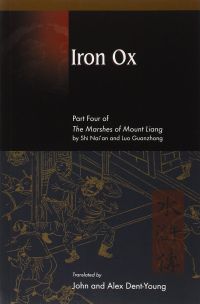
Get the Chinese University of Hong Kong Dent-Young translation of The Marshes of Mount Liang
Iron Ox: Part Four of The Marshes of Mount Liang. Chapters 63 to 90.
Available as a paperback (ISBN 9789622019898, 512 pages).
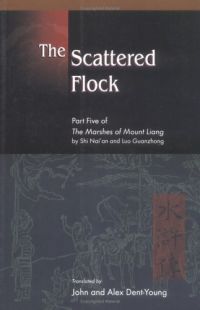
Get the Chinese University of Hong Kong Dent-Young translation of The Marshes of Mount Liang
The Scattered Flock: Part Five of The Marshes of Mount Liang. Chapters 91 to 120.
Available as a paperback (ISBN 9789622019904, 484 pages).
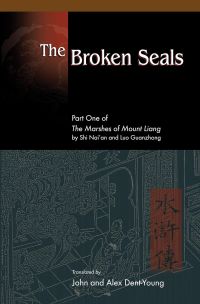
Get the Chinese University of Hong Kong Dent-Young translation of The Marshes of Mount Liang
The Broken Seals: Part One of The Marshes of Mount Liang. Chapters 1 to 22 of the full 120-chapter version.
Available as an ebook.
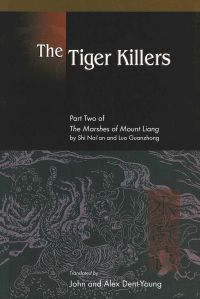
Get the Chinese University of Hong Kong Dent-Young translation of The Marshes of Mount Liang
The Tiger Killers: Part Two of The Marshes of Mount Liang. Chapters 23 to 43.
Available as an ebook.
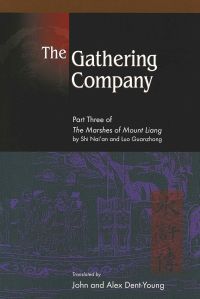
Get the Chinese University of Hong Kong Dent-Young translation of The Marshes of Mount Liang
The Gathering Company: Part Three of The Marshes of Mount Liang. Chapters 44 to 62.
Available as an ebook.
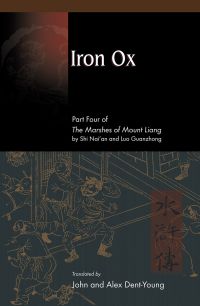
Get the Chinese University of Hong Kong Dent-Young translation of The Marshes of Mount Liang
Iron Ox: Part Four of The Marshes of Mount Liang. Chapters 63 to 90.
Available as an ebook.
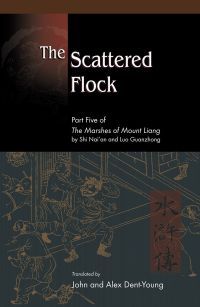
Get the Chinese University of Hong Kong Dent-Young translation of The Marshes of Mount Liang
The Scattered Flock: Part Five of The Marshes of Mount Liang. Chapters 91 to 120.
Available as an ebook.
Who are J.H. Jackson and Edwin H. Lowe?
See above for information on J.H. Jackson.
Edwin H. Lowe is a translator, author, and scholar who lives in Australia.
Quick facts about the Jackson and Lowe translation of Water Margin
Title: The Water Margin: Outlaws of the Marsh: The Classic Chinese Novel
Availability: In print!
Completeness: This is a translation of the 70-chapter version.
Romanization: Pinyin
More about the Jackson and Lowe translation of Water Margin
Includes an informative introduction by Edwin Lowe that talks about the historical context of the novel, its complicated publication history, and its influence as political commentary throughout the ages until modern times.
Includes a catalog of the “108 Heroes at Liangshan Marsh” that lists each one’s name, nickname, and chapter in which he first appears.
Includes the foreword by Shi Naian.
Includes explanatory footnotes by Edwin Lowe.
From the 2009 Preface by Edwin Lowe:
“In this edition of J.H. Jackson’s The Water Margin many of these shortcomings [shortened descriptions, degrading terms, Anglophone terms, and suppression of vulgar, sexual, and violent content] have been addressed. [I have retained] Jackson’s translation and therefore Jackson’s original narrative and voice as much as possible. I have translated and reinserted the sanitized descriptions of sexual seduction, the explicit descriptions of brutality and barbarity, and the profane voices…. The more nuanced and archaic idioms… have been either neutralized or updated for the Sinologically aware 21st Century reader…. I have tidied [Jackson’s awkward in-text notes] up by either deleting them or adding further comments of my own wherever they were required as footnotes. I have done this in order to distinguish my comments from Jackson’s…. Readers of this edition must understand that this is in no way a new translation, or a reinterpretation of the Shuihu story. In my more fanciful and vain glorious moments, I see myself merely continuing the Chinese literary tradition of editorship and revision.”
Extract from the Jackson and Lowe translation of Water Margin
First ~500 words of Chapter 1 (From Amazon):
During the reign of the Emperor Zhezong of the Song Dynasty there lived at the Eastern Capital Bianliang, in Kaifeng Prefecture, a loose profligate, named Gao.* He could handle well either spear or cudgel, and was an extremely good player at football. He was the second son of a Gao family, but instead of calling him Gao the Second,† people gave him the nickname of Gao Qiu meaning Gao “the Ball.” Later on, however, he adopted another character, also pronounced Qiu.
He could play well on wood or string instruments, but was no good at poetry or literature. If there was a discussion of benevolence, justice, propriety, wisdom, or virtue he was unable to take part. He wasted his time in the company of the son of a wealthy man, and every day these two spent their time in pleasure resorts. His conduct became so bad that at last the wealthy man lodged a complaint before the Prefect who had him arrested, punished with twenty blows of the bamboo, and then banished from the capital.
Gao Qiu went to Huaixi in Linhuai Prefecture where he found refuge in a gambling den, which afforded shelter to all the lazy rascals from all places. Three years after this, however, the Emperor granted an amnesty so as to show his benevolence. Upon hearing of this, Gao Qiu decided to return to the capital, and got an introduction to a man named Dong Jiangshi who kept a drug store at the Jinliang Bridge. Upon reading the letter, this man remembered the bad reputation of Gao Qiu, and was afraid that if he lived at his house he might have an evil influence on his children. So after about ten days Dong spoke to Gao Qiu, “Here we can offer you little help. I will however recommend you to a certain Su the Younger, a scholar, who may assist you in cutting a fine career. What do you think of that?”
Gao Qiu was much pleased at this and thanked Dong Jiangshi. Dong wrote a note and sent this with Gao Qiu to the residence of the high official. The doorkeeper announced the arrival, and the scholar Su came out to see Gao Qiu. He also remembered that Gao Qiu was a profligate and decided to get rid of him by recommending him to the Emperor’s son-in-law, the Prince Consort Wang Jinging as a steward.
The following day Su sent Gao Qiu with a servant to Prince Consort Wang Jinging. This Prince Wang was the husband of the younger sister of the Emperor Zhezong, and son-in-law of the Emperor Shenzong. He took pleasure in meeting flaboyant [sic], stylish men, and when he received the introduction he was glad, and he made Gao Qiu his personal attendant.
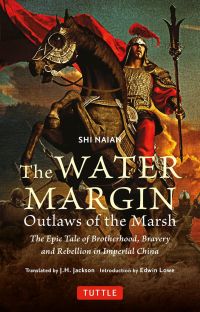
Get the Tuttle Jackson and Lowe translation of Water Margin
"This edition of the classic J. H. Jackson translation brings a story that has been inspiring readers for hundreds of years to life for modern audiences. It features a new preface and introduction by Edwin Lowe, which gives the history of the book and puts the story into perspective for today's readers. First translated into English by Pearl S. Buck in 1933 as All Men Are Brothers, the original edition of the J.H. Jackson translation appeared under the title The Water Margin in 1937. In this updated edition, Edwin Lowe addresses many of the shortcomings found in the original J.H. Jackson translation, and reinserts the grit and flavor of Shuihui Zhuan found in the original Chinese versions, including the sexual seduction, explicit descriptions of brutality, and the profane voices of the lower classes of Song Dynasty China. Similarly, the Chinese deities, Bodhisattvas, gods and demons have reclaimed their true names, as has the lecherous, ill-fated Ximen Qing. This 70-chapter book includes much that was sanitized out of the 1937 publication, giving Anglophone readers the most complete picture to date of this classic Chinese novel."
Available as a paperback (ISBN 9784805317877, 848 pages).
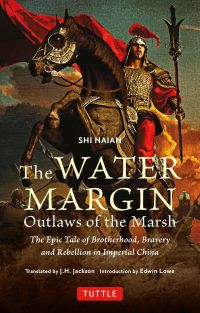
Get the Tuttle Jackson and Lowe translation of Water Margin
"This edition of the classic J. H. Jackson translation brings a story that has been inspiring readers for hundreds of years to life for modern audiences. It features a new preface and introduction by Edwin Lowe, which gives the history of the book and puts the story into perspective for today's readers. First translated into English by Pearl S. Buck in 1933 as All Men Are Brothers, the original edition of the J.H. Jackson translation appeared under the title The Water Margin in 1937. In this updated edition, Edwin Lowe addresses many of the shortcomings found in the original J.H. Jackson translation, and reinserts the grit and flavor of Shuihui Zhuan found in the original Chinese versions, including the sexual seduction, explicit descriptions of brutality, and the profane voices of the lower classes of Song Dynasty China. Similarly, the Chinese deities, Bodhisattvas, gods and demons have reclaimed their true names, as has the lecherous, ill-fated Ximen Qing. This 70-chapter book includes much that was sanitized out of the 1937 publication, giving Anglophone readers the most complete picture to date of this classic Chinese novel."
Available as an ebook (ISBN 9781462902590).
Water Margin: Original text in Chinese
https://www.gutenberg.org/ebooks/23863
Water Margin podcast!
https://outlawsofthemarsh.com/2019/01/01/episode-001-introduction/
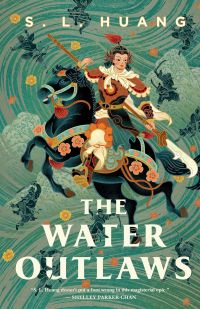
Get The Water Outlaws by S.L. Huang
From Tor: "Inspired by a classic of martial arts literature, S. L. Huang's The Water Outlaws are bandits of devastating ruthlessness, unseemly femininity, dangerous philosophies, and ungovernable gender who are ready to make history—or tear it apart." This seems like a shortened, gender-flipped version of Water Margin. Available in multiple formats. The same author also published a 42-page prequel novelette titled "The River Judge".
Available as a paperback (ISBN 9781250847980, 528 pages).
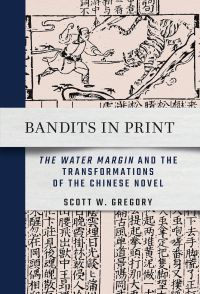
Get Bandits in Print: "The Water Margin" and the Transformations of the Chinese Novel by Scott W. Gregory
From Cornell East Asia Series: "Bandits in Print examines the world of print in early modern China, focusing on the classic novel The Water Margin (Shuihu zhuan). Depending on which edition a reader happened upon, The Water Margin could offer vastly different experiences, a characteristic of the early modern Chinese novel genre and the shifting print culture of the era."
Available as a paperback (ISBN 9781501769689, 192 pages).
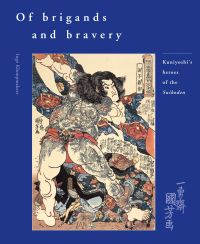
Get Of Brigands and Bravery: Kuniyoshi’s Heroes of the Suikoden by Inge Klompmakers
"This is the first monograph in English on the stunning series 'One hundred and eight heroes of the Suikoden'. 'The Suikoden' is the Japanese adaptation of the 14th-century Chinese vernacular novel 'Shuihu zhuan', which recounts the exploits of a group of brave and righteous rebels on Mount Liang.... This publication reproduces the 74 known designs [of the Kuniyoshi illustration series] in full color, each accompanied by an explanatory text."
Available as a paperback (ISBN 9789074822558, 200 pages).
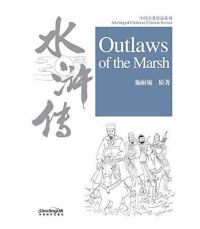
Get Outlaws of the Marsh: Abridged Chinese Classic Series by Sinolingua
Contains English and Chinese (characters and pinyin). "This book is an abridged version of the novel and contains 36 stories that are each approximately 1,500 characters in length or shorter. All the stories are limited to the 2,500 characters required by HSK Level 5."
Available as a paperback (ISBN 9787513813211, 192 pages).
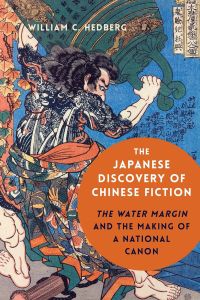
Get The Japanese Discovery of Chinese Fiction: The Water Margin and the Making of a National Canon by William C. Hedberg
From Columbia University Press: "In The Japanese Discovery of Chinese Fiction, William C. Hedberg investigates the reception of The Water Margin in a variety of early modern and modern Japanese contexts, from eighteenth-century Confucian scholarship and literary exegesis to early twentieth-century colonial ethnography." Ebook also available.
Available as a hardcover (ISBN 9780231193344, 264 pages).
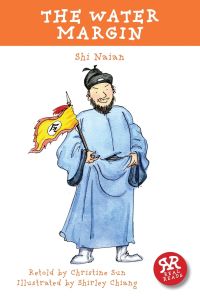
Get The Water Margin by Christine Sun, illustrated by Shirley Chiang
Very short illustrated children's version published by Real Reads. Ebook also available.
Available as a paperback (ISBN 9781906230371, 64 pages).
The three in-print versions aren’t really comparable in that they each represent a different target text. You can choose between them based on how many chapters you want to read, or based on format and availability, or based on how the extracts sound. To summarize:
1980 – Shapiro, Outlaws of the Marsh, American spelling, 100 chapters, 4-volume paperback and 3-volume hardcover from Foreign Languages Press.
2002 – Dent-Young, The Marshes of Mount Liang, British spelling, 120 chapters, 5-volume paperback and ebook available.
2010 – Jackson/Lowe, Water Margin, 70 chapters, an updated version of a 1937 translation, 1 volume paperback and ebook available from Tuttle.

